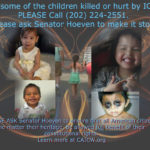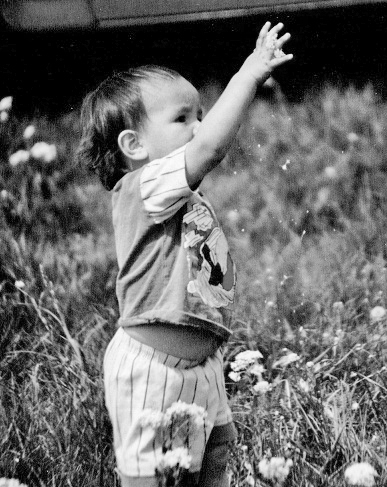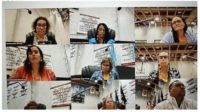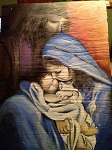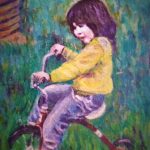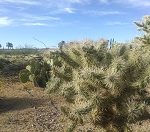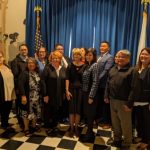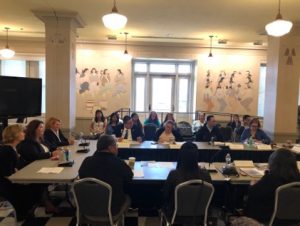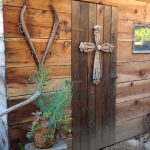The Alyce Spotted Bear and Walter Soboleff Commission on Native Children (also known as the congressional Commission on Native Children, or CNC) wants to hear your experience as a child with tribal heritage – OR – raising children who have tribal heritage. Too often, Commissions such as this have heard from only one segment of the population. However, this Commission – which is tasked by Congress to identify new strategies for lasting solutions and report back to them – wants to hear from ALL who have experience – no matter the relationship. Everyone matters.
– If you are an individual with tribal heritage – what were some of the most beneficial experiences you had growing up? What programs, entities, or individuals helped your growth most? Which experiences were most hurtful or destructive? Again, you can do this anonymously if you choose.
– If you are a parent, grandparent, other relative or foster/adoptive parent who is eligible for membership in a federal tribe but prefer to raise your child outside of the reservation system, please let the Commission know why. Your testimony can be anonymous and will help them to understand tribal members who choose not to be under tribal jurisdiction, as well as help them to assess whether living outside of government programs is beneficial to children.
– If you are a parent, grandparent, extended relative, or adoptive parent who is NOT eligible for membership, YOUR TESTIMONY IS JUST AS RELEVANT AND VITAL.
Has any government – federal, state, tribal or county – attempted to interfere with your
- chosen worldview?
- relationship with your extended family/parents/child/children, or
- method of raising children
If so – how has this affected the well-being of child/children involved?
~
HOW TO SEND
Written testimony is to be given just as much weight as oral testimony and CAN be anonymous.
To send signed testimony identifying you and/or the child – Send your testimony directly to the Commission at: asbwsnc@gmail.com
See near the bottom of the page for how to submit testimony anonymously.
~
WHAT TO SEND
“The Commission will focus its recommendations on solutions to issues that would improve the health, safety, and well-being of Native children, including: child welfare; physical, mental, and behavioral health; educational and vocational opportunities; school district policies and practices; access to cultural and extracurricular activities; juvenile justice; early education and development; wraparound services for Native children.”
It is important to tell your child’s story. Your honest opinion about any of what is described above is important. The Commission needs to know your observations and experience – good or bad. They won’t know the full spectrum of experiences if they continually hear only from the same sources.
Also – if your child has struggles in certain areas, let the Commission know why you think that might be and what methods have been used to try to resolve it.
One federal program, the Administration of Children and Families (ACF), has a budget of about 50 billion and “awards on the average $647 Million to Native Americans through programs like Head Start… TANF, LIHEAP,…and the Administration for Native Americans, to name a few.” Have any of ACF programs benefited your child? Why or why not? Which government programs have helped? Which have hurt?
If your child is doing well physically, emotionally, academically, and/or spiritually – let the Commission know and tell them which factors you believe helped your child attain that well-being. Was there a close relationship that inspired them? A particular tribal, federal, school or church program? – OR no program at all – just stable, loving home life? If so, the Commission NEEDS to know this.
If a Commission hears only from Social Service professionals who continually say ALL Native Children suffer from (fill in the blank) and All NEED a certain social service program to get better… than that is what they will decide needs to be done. If the Commission is not able to obtain alternate data, it will rely on the data social services, organizations and agencies give it.
If you have a different story – please tell it. If the best outcome for a child is in a stable and loving home setting, independent of government programs, the Commission needs to know this.
All the below suggested topics are OPTIONAL. We are putting them here merely to generate thought concerning current federal Indian policy.
You could choose to include any other issue related to your child that you feel needs addressing, including any words or phrases commonly used by governments or organizations when referring to children of heritage that you feel diminish your child.
These are some of the words, phrases and sentences found in the legislation enacting the Commission or providing data to the Commission. What are the thoughts and inferences behind those words? Do they paint a correct or incorrect perception of your child? Are they truthful or paternalistic and condescending? Do they promote children or protect victim-hood? Do you feel ‘triggered’ by any of the words and inferences made by government agents and policies, or do they seem correct to you?
- “The Wrongs We Are Doing Native American Children,”
- “The protective role of Native American culture and language”
- “Complex program requirements and limited resources stymie efforts to reduce the disparities among Native children.”
- “Acts of Self-Determination Foster Strong Native Families and Communities”
- “Native Language Holds Culture, Culture Holds Language, and Both Hold Wellness”
- “Stakeholders” (when referring to a selective group that you don’t believe includes you)
- Data on all “Native children” is required “to see how well children are cared for” and that the “rights of children and families are adhered to.”
- ICWA “protects the best interest of the Indian Child and promotes the stability and security of Indian tribes and families.”
- “Part of ensuring the safety and security of American Indian and Alaska Native (AI/AN) children is having basic data collected that provides information on their circumstances.”
- Under the AFCARS Rule, agencies can collect and keep “information on children who are not enrolled.”
- They will examine the “unique challenges Native children face”
- They will build “on the strengths and leadership of Native communities, with the goal of developing a sustainable system that delivers wrap-around services to Native children.”
- “Resources and supports for Native children are currently inappropriate, insufficient, or limited by bureaucracy so that they are ineffective.”
- “The vision of Native children and youth who are resilient, safe, healthy, and secure requires many types of evidence, including a wide range of evaluation data, descriptive research studies, performance measures, innovative practice models, financial and cost data, survey statistics, and analyses of program administrative data; all contributing to shared strengths-focused narratives relevant and useful to tribal leadership and stakeholders.”
OPTIONAL Adoption/Foster care Questions: [Wording is pulled from the conclusions of a 1998 pilot study report]
1. Does placing American Indian children in foster/adoptive non-Indian homes puts them at great risk for experiencing psychological trauma leading to the development of long-term emotional and psychological problems in later life?
2. Are there unique factors of Indian children being placed in non-Indian homes that create damaging effects in the later lives of the children?
3. Do American Indians have a cognitive process different from non-Indians – a cognitive difference in the way Indian children receive, process, integrate and apply new information—in short, a difference in learning style”?
a. Is the difference in learning style a cognitive difference in race, a familial difference, an issue unique to your child, or a symptom of fetal alcohol effects?
4. Are the ties between Indian children and their birth families and culture extremely strong, and the ties between Indian children and non-Indian foster/adoptee families only “foster parent-tie-to-Indian child, not Indian child-ties-to-foster parent?”
5. Do American Indian adults who were adopted into non-Indian families as children have greater problems with self-identity, self-esteem, and inter-personal relationships than do their peers from non-Indian and Indian homes?
6. Do Indian adoptees, regardless of age at placement, list identity with their family and their tribe as their first priority, and the sorrow of not knowing their culture, language, heritage and family as a life-long, often emotionally debilitating anguish?
Encourage as many people as possible to send in their testimony. There has been a long history of misinformation concerning children who have heritage, and it will take the stories of quite a few people to begin to correct the mind-view of government agencies.
~
TO PROVIDE ANONYMOUS TESTIMONY TO THE COMMISSION:
For the Commission to receive anonymous testimony, signed testimony must be given to a trusted CNC Commissioner who will then verify it, remove identifying data, and deliver as anonymous to the full Commission. Elizabeth Morris, chair of CAICW, is a CNC Commissioner.
Elizabeth will keep your signed copy in a protected file and deliver the anonymous copy to the Commission.
You can submit your testimony to Elizabeth Morris at:
administrator@caicw.org
or mail through USPO to:
PO Box 460, Hillsboro, ND 58045
Other Commissioners of the Alyce Spotted Bear and Walter Soboleff Commission on Native
Children who can receive signed testimony and provide an anonymous copy to the Commission are:
Gloria O’Neill (Chair)
President/CEO, Cook Inlet Tribal Council, Inc.
Alaska
Tami DeCoteau, Ph.D. (Co-Chair)
DeCoteau Trauma-Informed Care & Practice, PLLC
North Dakota
Carlyle Begay
Former State Senator
Arizona
Dolores Subia BigFoot, Ph.D.
Director, Indian Country Child Trauma Center
Oklahoma
Jesse Delmar
Director, Navajo Nation Division of Public Safety
Arizona
Anita Fineday
Managing Director, Indian Child Welfare Program, Casey Family Programs
Minnesota
Don Atqaqsaq Gray
Board Member, Ukpeagvik Inupiat Corporation
Alaska
Leander R. McDonald, Ph. D.
President, United Tribes Technical College
North Dakota
Elizabeth (Lisa) Morris
Administrator, Christian Alliance for Indian Child Welfare
North Dakota
Melody Staebner
Fargo/West Fargo Indian Education Coordinator
North Dakota
